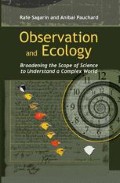Abstract
We have been hinting all along that ecology has a more prominent role to play in public policy debates than ever before. The multiple-scale and large-scale ecological changes that are tailored to large, multiple-scale networked ecological observations that we discussed in Chapter 6 should also be the focus of policy changes at multiple scales of governance — from local to global. Yet career ecologists have been frustrated at how little progress ecology as a science has made in turning the tide of environmental degradation and destruction. In this chapter we dive into this paradox by looking at the ecology of policy making itself and identifing matches and mismatches between ecological science and the complex ecology of politics.
Reference
Adler JH (2003) “Fables of the Cuyahoga: Reconstructing a History of Environmental Protection.”. Fordham Environmental Law Journal 14:89
Cutright PR (1985) Theodore Roosevelt: The Making of a Conservationist. Univ. of Illinois Press, Urbana and Chicago, IL
Dellwo LM (2010) 17 Years of Duke Forest Comes to a Close — Long-Term Ecological Experiment Will Continue to Provide Critical Data About the Impacts of Rising Carbon Dioxide., Dukenviroment Magazine
Gillis J (2010) A Scientist, His Work, and a Climate Reckoning., 21 December
Groffman PM, Stylinski C, Nisbet MC, Duarte CM, Jordan R, Burgin A, Previtali MA, Coloso J (2010) Restarting the Conversation: Challenges at the Interface between Ecology and Society. Frontiers in Ecology and the Environment 8(6):284–91
Mohan JE, Ziska LH, Schlesinger WH, Thomas RB, Sicher RC, George K, Clark JS (2006) Biomass and Toxicity Responses of Poison Ivy (Toxicodendron Radicans) to Elevated Atmospheric CO2. Proceedings of the National Academy of Science 103(24):9086–89
Miller C (2007) The Garbage Barge., 1 February
Olson R (2009) Don’t Be Such a Scientist. Island Press, Washington, DC
Turco RP, Toon OB, Ackerman TP, Pollack JB, Sagan C (1983) Nuclear Winter — Global Consequences of Multiple Nuclear-Explosions. Science 222(4630):1283–92
Farman JC, Gardiner BG, Shanklin JD (1985) Large Losses of Total Ozone in Antarctica Reveal Seasonal Clox/Nox Interaction. Nature 315:207–10
Molina MJ, Rowland FS (1974) Stratospheric Sink for Chlorofluoromethanes: Chlorine Atom-Catalysed Destruction of Ozone. Nature 249:810–12
Meyer JL, Frumhoff PC, Hamburg SP, de la Rosa C (2010) Above the Din but in the Fray: Environmental Scientists as Effective Advocates. Frontiers in Ecology and the Environment 8(6):299–305
Goyert W, Sagarin R, Annala J (2010) The Promise and Pitfalls of Marine Stewardship Council Certification: Maine Lobster as a Case Study. Marine Policy 34(5):1103–09
Sagarin, R. D. “Historical Studies of Species’ Responses to Climate Change: Promises and Pitfalls.” In Wildlife Responses to Climate Change: North American Case Studies, edited by Stephen H. Schneider and Terry L. Root: Island Press, 2001.
Hawken P (2007) Blessed Unrest: How the Largest Movement in the World Came into Being and Why No One Saw It Coming. Viking, New York
Revkin AC (2010) Into the Breach. Frontiers in Ecology and the Environment 8(6):283–83
Turnipseed M, Roady SE, Sagarin R, Crowder LB (2009) The Silver Anniversary of the United States’ Exclusive Economic Zone: Twenty-Five Years of Ocean Use and Abuse, and the Possibility of a Blue Water Public Trust Doctrine. Ecology Law Quarterly 36(1):1–70
Scott A (1999) Trust Law, Sustainability, and Responsible Action. Ecological Economics 31:139–54
Whitmer A, Ogden L, Lawton J, Sturner P, Groffman PM, Schneider L, Hart D, Halpern B, Schlesinger W, Raciti S, Bettez N, Ortega S, Rustad L, Pickett STA, Killelea M (2010) The Engaged University: Providing a Plat form for Research That Transforms Society. Frontiers in Ecology and the Environment 8(6):314–21
Author information
Authors and Affiliations
Rights and permissions
Copyright information
© 2012 Rafe Sagarin and Aníbal Pauchard
About this chapter
Cite this chapter
Sagarin, R., Pauchard, A. (2012). Ecology’s Renewed Importance in Policy. In: Observation and Ecology. Island Press, Washington, DC. https://doi.org/10.5822/978-1-61091-230-3_9
Download citation
DOI: https://doi.org/10.5822/978-1-61091-230-3_9
Publisher Name: Island Press, Washington, DC
Print ISBN: 978-1-59726-354-2
Online ISBN: 978-1-61091-230-3
eBook Packages: Earth and Environmental ScienceEarth and Environmental Science (R0)

